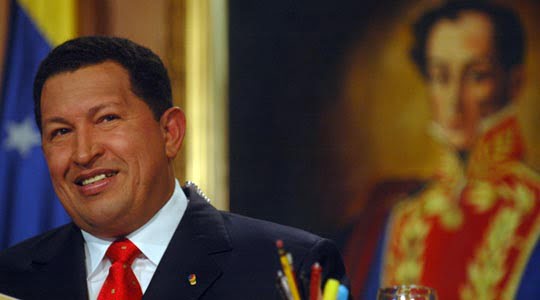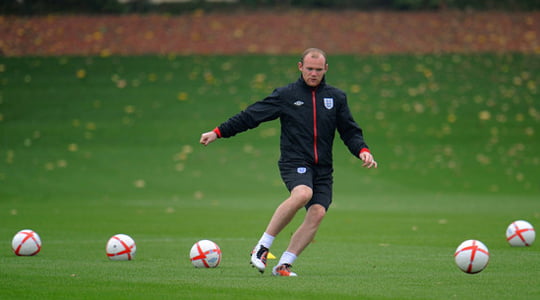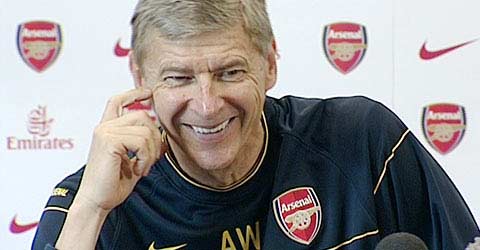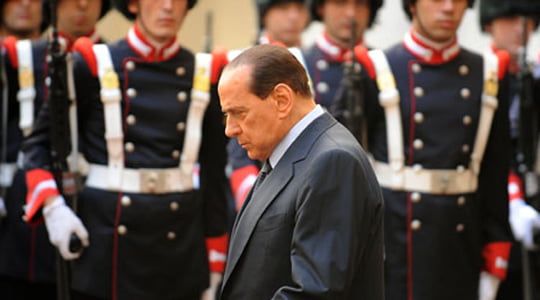After World Cup, Does Football Unite Spain?
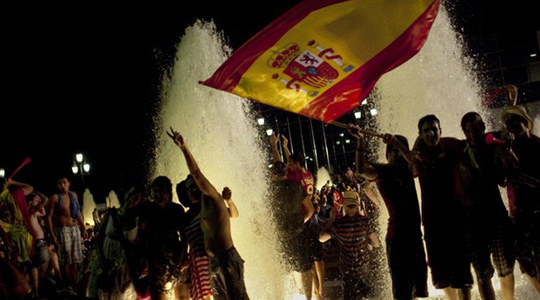
World Cup victory has put the national flag proudly on display across Spain.
Yet for some – including Basques and Catalans – the flag clashes with their aspirations for greater self-rule.
Here Walter Oppenheimer, a Catalan journalist with the Spanish daily El Pais, examines the impact of World Cup euphoria in Spain.
Is football helping to unite Spain?
Can the first Spanish World Cup victory achieve what no politician has been able to do for decades, if not centuries? I don’t think so, I’m afraid.
Victory in South Africa was fantastic news. It will cheer up a country terribly depressed after the recession, inject a lot of confidence and help the Spanish people to go out and spend more and boost the recovery a bit. It may even help the unemployed – 20% of the working population – to look to the future in a better mood. But it’s not going to end the so-called Catalan problem or the Basque problem.
Pragmatic patriotism
I’m a Catalan myself, despite my name. I was born and raised in Barcelona, but I’m not a patriot. Not a Spanish patriot, nor a Catalan one. Borders are not my cup of tea – I love to speak Catalan in Madrid and Spanish in Barcelona. So I think I understand what the Catalans want, but I have a sense of perspective. And I love football. And Barca [Barcelona] in particular. The Spanish team, too. As millions of Catalans do.
Air force jets paraded the national colours over Madrid Some Catalans hate the Spanish team, but most of them don’t. Equally, some Catalans want independence but most of them don’t. They might be ready to support it one day if necessary, but not yet, because they don’t feel they need to be outside of Spain.
Most Catalans are Catalanists, which is something rather different from pro-independence: they love Catalonia more than they love Spain, but they don’t hate Spain.
The same happens with the Spanish team: they support the squad, but they are not prepared to put the Spanish team before Barca, for example. It has always been like that.
Playing to strengths
Politicians and the media claim these days that the key to the Spanish victory in South Africa was unity – that it shows how important and easy it is to bury regional political differences.
I think what this victory really shows is that Spain has a generation of fantastic players and, as important as that, some time ago decided to forget the stupid idea of “la furia”. This was a very racial and Franco-era concept of football based on character rather than ability. Instead, Spain embraced the natural qualities of its players: passing and technique, rather than physical power.
The day before millions celebrated victory against Holland right across Spain – including in Barcelona – more than a million people demonstrated in Barcelona against a judicial decision to reduce the powers of the Catalan parliament. This problem is not going to disappear just because the mood has improved. Catalans celebrate the squad’s victory and the rest of Spain happily accepts that Barca players were the key to success.
All this is very welcome but it is not even new. The same happened in 1992, when the Olympic Games was a great success and Barcelona – even the sacred Nou Camp stadium! – was full of Catalan and Spanish flags. Optimism took hold of Spain, but the Catalan problem didn’t change one bit.
Here are some of your comments on this story:
Corali, Barcelona, says:
Great article, thanks for writing it. I think it portrays very well the overall feeling or zeitgeist existing in Catalonia/Spain at the moment, at least, in my opinion most of the Catalan individuals would mostly agree with it. Thanks for shedding some light to this matter; I hope it helps other people from abroad in understanding the complexity of our idiosyncrasy.
Joan Mitjavila, Vic, Catalonia, says:
In Catalonia we don’t feel there is a greater unity. During this World Cup there was some more support for the Spanish team from Catalonia because most of the players belonged to Barcelona team and because the Spanish team played “Barcelona style”. However there is a separation growing deeper between Catalonia and the rest of Spain. There has been a constant anti-Catalan campaign (promoted by the conservative party – PP) in recent years. Now there is a sense of deep distrust between Catalonia and Spain – a situation which seems difficult to solve in the near future.
Carlos Pi, Barcelona, says:
My father is one of six brothers from Barcelona. My mother is one of five sisters from Madrid. We grew up in Madrid, driving to Catalonia every year for Christmas. I have always felt frustrated by the tensions between Spanish regions, which now seem at an all-time high in my lifetime. The night we won I heard people chant centralist slogans: “Hola hola hola, Barcelona es Espanola!”. Back at the office today there were still some disgruntled Catalans complaining about ‘excessive TV coverage’ of the celebrations yesterday and last night. I am so proud of the Spanish team, my team. If only the rest of the population could have a more pragmatic attitude, closer to that of the players that brought the World Cup home.
Joseba, Elorrio, Basque country, says:
I am Basque and live in the Basque country. I, along with most of the people in our town, wanted Holland to beat Spain. Unlike other not-yet independent countries such as Wales, Scotland or NI, we are not allowed to field our own Basque national team in international competitions. Basque players such as Xabi Alonso in my opinion should not play for Spain out of protest, but I understand that they need to further their careers. Personally, I could never put a Spanish shirt on my back, knowing the oppression that they impose daily on Basque people. But this is a country where politics rules and no Basque national team indirectly means more votes for the Spanish parties, in the same way that it is in the interests of the Spanish government that ETA continues to exist (despite what they say). As long as there is ‘terrorism’, there are votes for PP and PSOE.
Oier Aristizabal, Oiartzun, Basque Country, says:
Well, I do not think it will have a major impact on the Catalan and Basque issues. The fact that after the referee blew the final whistle Carles Puyol (Barcelona’s captain) and Iker Casillas (Real Madrid’s captain) euphorically hugged each other does not mean, despite some other arguments, that we are facing a new era to solve this problem. Afterwards, Puyol proudly waved the Catalan flag and so did Casillas with the Spanish one. Football is a good example for many aspects in life, including politics, but in the end it is a game. It is, as I see, strictly sports and not politics. Anyway, we tend to mix them, we cannot help it. I am an Euskaldun (Basque) and I was happy to see Spain winning the World Cup. They definitely deserved the trophy. I would love to see one day the Basque National team qualifying for the World Cup. At least we should have the same chance as the Scottish, Welsh and Northern Irish do, alongside England within the United Kingdom. All in all, Spain is an artificial union. It was never united in a friendly manner but with blood and fire. Different kingdoms in Spain did not get together happily, but after being defeated in bloody wars. That is why the problem still exists and I do not think the World Cup winning will make Spain a more united nation.
Richard Smith, Bilbao, says:
Here in Bilbao I’ve watched the Spanish team progress, and had hoped for the dream formula; that Athletic de Bilbao’s Fernando Llorente would score the goal that won them the World Cup. Sadly, in my local bar on the night of the final, there was a sign that read: “Here we support only Holland. Spaniards no thanks!”
Asier, Bilbao, Euskal Herria, says:
As a Basque myself I want independence for my country more than ever, after seeing with dismay this show of Spanish intransigent nationalism. And of course I wanted Holland to win the final. It’s not nice to see people with the Spanish flag (most of them Spanish colonialist immigrants), some of them shouting “Franco, Franco” in your city, knowing that they don’t let us decide our future or have our national teams. Independence and freedom for the Basque Country and Catalonia NOW!
Barrie Jackson, Madrid, says:
The World Cup victory is fantastic and it takes the magnifying glass away from the incompetent government for a while. But nothing has changed sadly. The sale of flags and tee shirts has increased but I suppose the vast majority have been produced in China so the Spanish economy doesn’t even benefit from this. The sale of beer and soft drinks in bars has increased as a result of the televised matches but that’s all. Living in Madrid I can’t comment on Catalunya or the Basque Country save to say that before the WC putting a flag on your car or on your balcony was a right wing fascist symbol. Temporarily it’s been accepted as reflecting the football team. So I repeat, business as usual, high unemployment, increased taxation, corrupt politicians, pesimism, number one concern to everyone is the threat of being made unemployed, no light at the end of the tunnel of the economic recession, no political unity.
Albert Busquets, Barcelona, says:
I’m from Catalonia. I just feel Catalan, not Spanish. I don’t hate the Spanish. In fact, being an “independentist” doesn’t imply I hate Spain. But I don’t want to be part of that country. They don’t understand our language, our culture and our traditions. In fact, there are a lot of Spaniards that hate us, giving derogatory names to us, but on the other hand they don’t want independence for us because of our taxes. We pay more than other people from the same country. We have different rights and responsibilities, but we receive less facilities than others. I don’t trust that journalist when he says that you can speak Catalan in Madrid. That’s completely false. You can have a problem if you do that. Anyway, independence can’t be a reality if our politicians don’t act with responsibility and unity in Madrid.
Borja, Ferrol, Galicia, says:
Whenever people talk about nationalism problems in Spain, many usually forget that in Galicia there are many people who support greater autonomy from Madrid. Galicia is arguably the territory with more signs of distinction in the Iberian Peninsula, apart from Portugal, including language (the second most spoken in Spain after Castellano and Catalan), culture, weather and geography. The reason why there is no more Galician nationalist representation in the Spanish Parliament relates to the fact that nationalist parties in Galicia (concentrated in a group called BNG – Bloque Nacionalista Galego) are more supportive of independence, unlike the most representative nationalist Basque and Catalan parties, which support greater autonomy without breaking the structure of the Spanish nation. This make them seem less radical than BNG in Galicia and, thereby, get electoral support from non-nationalist voters who wish more power in Madrid’s parliament.
Beatriz Garcia Duecias, Madrid, says:
I fed up with this “separatist” thing. Plenty of Catalans are as well. I live in Madrid but I have family and friends in Barcelona. I love that city! And I really don’t understand why a few politicians want to split apart the whole peninsula territory. But I also think that there are a few politicians making a lot of noise. When you go to Catalunya in a big city nobody cares about separation; no-one wants it. Usually it is in smaller towns where people want to be separated. And the funniest thing is that Montilla (a strong Catalan person) is naturally from Aragon. Celebrating the football victory it isn’t a question of flags or patriotism! I think that Spanish people used these items to express a collective feeling without thinking about politics and so on. What I loved here is that there was a spontaneous feeling of happiness and sympathy for this young football team! Viva la fiesta!
Iso Peyer, Sursee, Switzerland, says:
Dear Mr Oppenheimer. You write that the Catalans “might be ready to support independence one day if necessary, but not yet”, thus suggesting that Spain is still in unity thanks to Catalan good will and benevolence (among other factors, I suppose). Perhaps things are as you say, perhaps they are not. Why do you use words like “if necessary” and “not yet”? In my opinion, a more judicious choice of words would be appropriate, considering that the Catalans do not represent a majority in Spain.
Nicolas, Madrid, says:
I read Walter Oppenheimer’s articles on the UK regularly in El Pais and since he seems to understand Britain better than many Britons, it is interesting to read his ideas about his own country. The only point I would take issue with in this article is the conclusion he draws about the significance of the demonstration in Barcelona against a judicial decision to reduce the powers of the Catalan parliament one day before the joyous celebration in the same city of the World Cup victory. Therein lies the dilemma for many Catalans. They can’t help but feel Spanish, much as many of them would like to reject this inconvenient part of their own identity. Finally, I would like to add a point Mr Oppenheimer, perhaps as a Catalan, doesn’t make. And that is that whilst Catalans remain fascinated by questions of their own identity, they don’t quite see the effect that immigration, especially from South America, is having, and will increasingly have, on that very identity. These immigrants are Castilian speaking and may have other ideas about the linguistic, cultural and social future of Catalonia then the traditional notions of what it means to be Catalan. Anyone who witnessed the explosion of joy amongst immigrants at Spain’s World Cup victory in the Madrid neighbourhood of Lavapies or in Barcelona’s El Raval would have seen more than a fledgling sense of integration and pride amongst people not born in Spain. That pride and that new sense of identity is Spanish. It’s hard to see the same communities in Barcelona joining a demonstration in defence of Catalan powers or of the Catalan language with quite the same enthusiasm.
